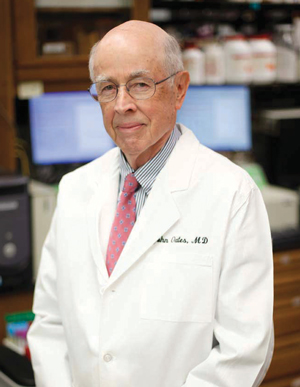
Dr. John Oates, an internationally known physician at Vanderbilt University School of Medicine and a founder of the discipline of clinical pharmacology, died July 30 in Nashville after a short illness. He was 87.
The Thomas F. Frist Sr. Professor of Medicine, he founded the Division of Clinical Pharmacology at Vanderbilt in 1963 as a joint division of the departments of medicine and pharmacology. He chaired the Department of Medicine from 1983 to 1997.
In the laboratory Oates made fundamental contributions to current understanding of the effects of aspirin on prostacyclin and thromboxane and platelet function. His publications have been cited more than 36,000 times.
“It is impossible to quantify the impact of John Oates on this institution,” says Dr. Nancy Brown, the Hugh Jackson Morgan Professor and current chair of the Department of Medicine at Vanderbilt. “Our strengths in personalized medicine and clinical and translational science stem from a vision and a groundwork that he laid many years ago.”
Oates “promoted a culture of collaboration across departments and valued mentorship,” adds Brown, a former division director of clinical pharmacology. “John had an incisive intellect. He always managed to ask the consequential question. He did so politely and kindly, and thus drove those around him to reach higher.”
A native of North Carolina, Oates earned his bachelor’s degree in 1953 from Wake Forest College (now Wake Forest University) and his medical degree from the college’s Bowman Gray School of Medicine three years later.
He received clinical training at the New York Hospital–Cornell Medical Center and research training at the National Heart Institute in Bethesda, Maryland, where he was a clinical associate and senior investigator.
In 1959 he and his colleagues observed that a drug called methyldopa appeared to lower blood pressure. At the time there were no effective treatments for severe hypertension. Methyldopa, developed and marketed as Aldomet by Merck, became the first.
It was in this dynamic and uniquely productive environment—where discoveries and approaches from the laboratory were applied to clinical research—that Oates’ vision for clinical pharmacology germinated.
After joining the medical school faculty at Vanderbilt in 1963, he established one of the nation’s first divisions of clinical pharmacology and directed the division for the next 25 years.
Among Oates’ many discoveries, those in the field of prostaglandin biology are most noted. The Oates team defined the role of prostaglandins in renin release by the kidney, demonstrating the importance of prostaglandins as a pathway parallel to the adrenergic nervous system in controlling renin release and regulating blood pressure.
In recent years Oates and his collaborators pursued clinical development of small-molecule scavengers of these reactive molecules to treat diseases driven by oxidative stress, including Alzheimer’s disease, hypertension and coronary artery disease.
Oates was president of the Association of American Physicians, president of the American Federation for Clinical Research, and vice president of the American Society for Clinical Investigation.
He was a fellow of the American Association for the Advancement of Science and the American Academy of Arts and Sciences and a member of the National Academy of Medicine.
Oates is survived by his wife, Meredith; his children, David, Larkin and Jim; and four grandchildren.
—Bill Snyder and Leigh MacMillan